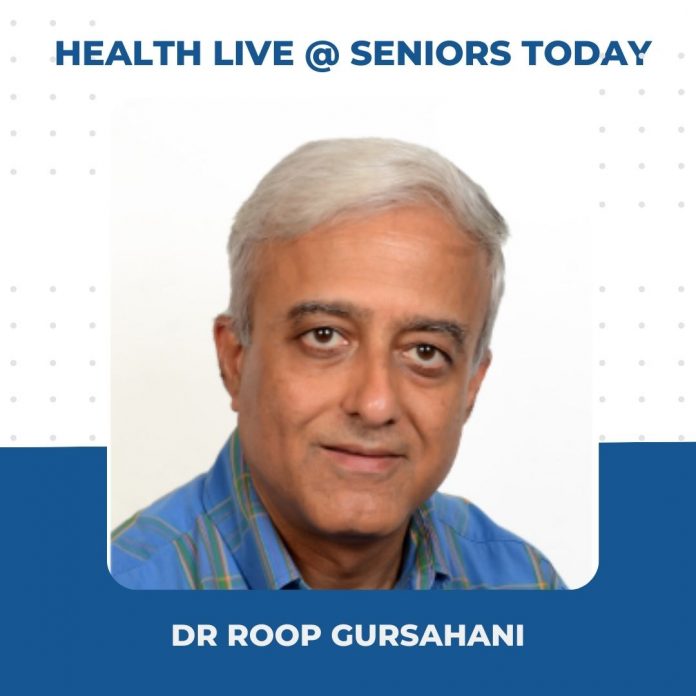On Saturday, June 5, 2021,we once again hosted Dr Roop Gursahani on our weekly Health Live webinar at Seniors Today. Dr Roop answered questions on dementia and neurological care for seniors.
Dr Roop Gursahani is a Consultant Neurologist and Epileptologist, at the PDHinduja National Hospital, Mahim and Hinduja Healthcare Surgical, Khar, Mumbai. He is trained at GMC, Nagpur and GMC and the Sir JJ Hospital in Mumbai.
– When you are afflicted by dementia, the individual suffering normally will recognise it, though there are of course cases where the judgement of the patient is also affected and they may be less aware of it than the people around them are. Today, there is enough evidence to suggest that anybody who has dementia actually had the whole pathological process begin in their brain 20 years before. Which means that somebody who had dementia at the age of 70, the changes had begun way before it.
– When it comes to prevention, there isn’t much that you can do. There is a certain genetic endowment that we all carry. If there is any history of dementia in the family then you need to be particularly careful.
If your parents or relatives from your immediate family do not have dementia even then you cannot, with complete certainty say that you wouldn’t suffer from it either. This is because there are a lot of factors and a host of influences that have been building over a long time.
– The care that you need to take of the individual suffering will vary according to the stage of the dementia.
In the very early stages, you take care of the basic things. Make sure that all the factors that can worsen the outcome are avoided. You also need to take care of the vascular risk factors.
– Vascular risk factors are anything that can deteriorate the condition of the vessels to the heart or the brain- hypertension, diabetes, high cholesterol levels, smoking, overweight (waist to hip ratio), excessive alcohol consumption. These are some factors that can be corrected and tackled.
– There are certain medications that some people take to slow down the process of dementia but there is still some doubt about how well the medications work in slowing down the process.
If you take the medicine and don’t take care of the aggravating factors, it will still worsen things.
– The second stage is when the individual starts to become dependent. In this situation more than medications, the main concern is to keep the individual engaged, occupied and active. As the disease progresses, the individual starts finding it difficult to carry out instrumental activities of the day.
– Medications- yes, there are medications that we can use and prescribe at this stage but they are not always effective. There are times when Dr Roop has seen that patients come with side effects after being put on medications following which he has to take the individuals off them.
– After this stage, the next stage is when the patient becomes completely dependent and needs help with everything. His speech suffers, etc. At this stage the care required is very intensive.
– Towards the later stages of dementia, the oral structures and functions involved start getting affected such as speech, eating or swallowing, etc.
– Medications that are given to patients suffering from dementia are given to control their symptoms and the ones that are absolutely necessary. If they are excessively agitated, provided there is no other cause for it, you need to give them medication to keep them calm, make sure they sleep and wake at an appropriate time, diabetes, hypertension, etc.
An MRI cannot show deterioration of the brain cells but a few other things can be picked up. These are
- Clots. If anyone’s brain is showing clots on the MRI due to any of the vascular causes it can be seen over the MRI. Sometimes these clots are not large enough to cause immediate detrimental damage but it can guide us in the right direction to avoid damage in the future.
- Looking at specific structures in the brain. This is usually not done unless the neurologist specifically asks for it. There is a structure in the brain that is called the hippocampus which is largely where your RAM is located. In patients who develop dementia especially of the Alzheimer’s type, there is shrinkage seen in the hippocampus. And this helps us detect the disease long before the symptoms appear.
- Atrophy. This is the shrinkage of the brain. This is associated with advanced age as well.
Loss of smell is an early marker of brain lesion and it is one of the senses that we look into. For example Parkinson’s is associated with loss of smell.
Dr. Roop strongly recommends having a paid caretaker who you can trust to help you out at home with dealing with and taking care of an individual suffering from dementia.








